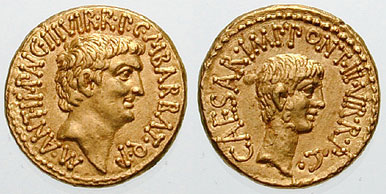
Second Triumvirate
The Second Triumvirate was an extraordinary commission and magistracy created for Mark Antony, Lepidus, and Octavian to give them practically absolute power. It was formally constituted by law on[1] 27 November 43 BC with a term of five years; it was renewed in 37 BC for another five years before expiring in 32 BC. Constituted by the lex Titia, the triumvirs were given broad powers to make or repeal legislation, issue judicial punishments without due process or right of appeal, and appoint all other magistrates. The triumvirs also split the Roman world into three sets of provinces.
This article is about the magistracy in the Roman Republic. For the second of the 19th century AD Argentinian alliances, see Second Triumvirate (Argentina).
The triumvirate, formed in the aftermath of a conflict between Antony and the senate, emerged as a force to reassert Caesarian control over the western provinces and wage war on the liberatores led by the men who assassinated Julius Caesar. After proscriptions, purging the senatorial and equestrian orders, and a brutal civil war, the liberatores were defeated at the Battle of Philippi.[2] After Philippi, Antony and Octavian took the east and west, respectively, with Lepidus confined to Africa.
Octavian and Antony were pushed to cooperation, in part by their soldiers, and the triumvirs had their legal arrangement renewed for another five years in 37 BC. Eventually, after Antony's defeat in Parthia and Octavian's victory over remnant Pompeians in Sicily, Octavian forced Lepidus from the triumvirate in 36 BC. Relations between the two remaining triumvirs broke down in the late 30s BC before they fought a final war, from which Octavian emerged the victor.
Name[edit]
The name "Second Triumvirate" is a modern misnomer derived from the branding of the political alliance between Pompey, Crassus, and Caesar (created c. 59 BC) as the "First" Triumvirate. This nomenclature was unknown during and before the Renaissance and was first attested in the late 17th century, coming into widespread use only in the following century.[3] Recent books have started to avoid the traditional nomenclature of "First" and "Second" Triumvirates.[4] The Oxford Classical Dictionary, for example, warns "'First' and 'Second Triumvirate' are modern and misleading terms".[1]
Legacy[edit]
In formation of the Principate[edit]
The ascendancy of Octavian at the triumvirate's close was closely followed by his constitutional "settlements" and the formation of the Principate and the Roman empire.[96] The creation of the triumvirate and its system of absolute rule, however, was not then known to be permanent. Even in the imperial period, writers like Tacitus reflected on how the republic had been dominated by single men before.[97] Moreover, it was not inevitable that the triumvirs were going to defeat the liberatores.[98] Their successful campaign, culminating at Philippi, was recognised in coming generations as a turning point in the republic's history. Tacitus, for example, dates the end of the republic to the triumviral victory there, which left the republic defenceless and nulla iam publica arma (i.e., the republic was disarmed).[99][100] Erich Gruen, in Last generation of the Roman republic, attributes the republic's collapse to the long and brutal conflicts after Caesar's assassination, largely fought by (and then between) the triumvirs, which eventually "made it impossible to pick up the pieces".[101]
The mass violence of triumviral rule and their untraditional form of government was contemporaneously seen as illegitimate.[102] To combat such charges, the triumvirs attempted to preserve the appearance of republican practices and legality.[102] Of course, the extent to which the triumvirate heeded republican traditions changed over time. Over time, as the political situation stabilised, Octavian in Rome resumed the normal operation of the consulship (rather than appointment of many and multiple suffect consulships in a single year).[103]
The traditional magistrates did not yield all of their duties to the triumvirs; they were still expected to and did conduct public business. Moreover, the consuls still exercised some degree of independent political authority.[104] The traditional means of moving legislation before the senate and the assemblies also was not abandoned: the triumvirs moved multiple laws before the people on diverse subjects such as extending citizenship, ratification of Antony's eastern settlements, extension of the triumvirate, and expanding the patriciate.[105] While the mere operation of the republic's institutional machinery did not represent a free state, the triumvirs made a show of following traditional legal niceties.[106] The triumvirs at various times also made repeated promises or offers to give their powers back to the senate and people, though of course these promises were never kept.[107] Most especially, the triumvirs' powers to appoint all provincial governors served as part of the division between military and civic provinces later adopted in Augustus' political settlements.[108]
In Roman culture[edit]
The political chaos of the triumviral years proved a ladder for many provincials, veterans, and former slaves. Many of the great works of Latin literature were produced in this unstable period, such as Horace's Epodes and Satires, Virgil's Eclogues and Georgics, and the histories of Sallust and Asinius Pollio.[102] The political competition between Octavian and Antony provided the impetus for Octavian's ally, Gaius Maecenas, to support many leading artists of his day.[109]
Virgil's Eclogues, for example, shed light on the fears of shepherds and herdsmen in rural Italy during Octavian's land confiscations when he sought lands to settle veterans in the aftermath of Philippi. The proscriptions also proved a topic of embellishment; many stories are told of the plight of victims and their attempts to escape. Cicero's plight during the proscriptions, especially, was a recurrent topic in ancient schools of oratory.[110]